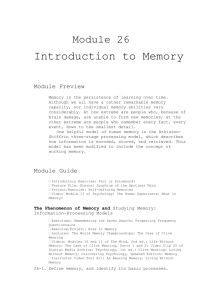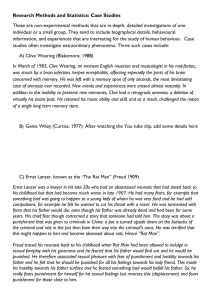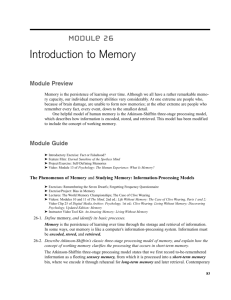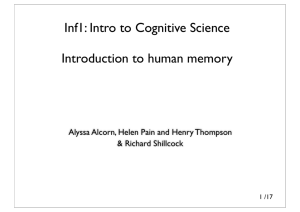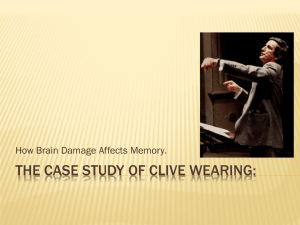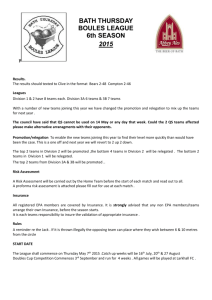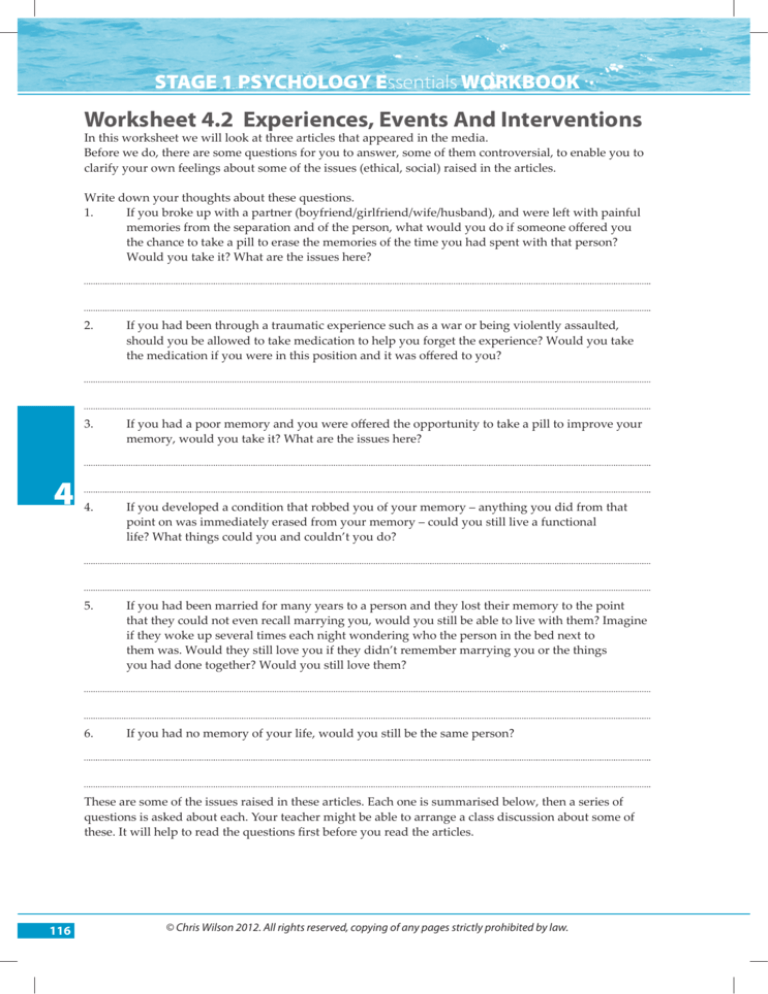
STAGE 1 PSYCHOLOGY Essentials WORKBOOK
Worksheet 4.2 Experiences, Events And Interventions
In this worksheet we will look at three articles that appeared in the media.
Before we do, there are some questions for you to answer, some of them controversial, to enable you to
clarify your own feelings about some of the issues (ethical, social) raised in the articles.
Write down your thoughts about these questions.
1. If you broke up with a partner (boyfriend/girlfriend/wife/husband), and were left with painful memories from the separation and of the person, what would you do if someone offered you the chance to take a pill to erase the memories of the time you had spent with that person? Would you take it? What are the issues here?
4
2. If you had been through a traumatic experience such as a war or being violently assaulted, should you be allowed to take medication to help you forget the experience? Would you take the medication if you were in this position and it was offered to you?
3. If you had a poor memory and you were offered the opportunity to take a pill to improve your memory, would you take it? What are the issues here?
4. If you developed a condition that robbed you of your memory – anything you did from that point on was immediately erased from your memory – could you still live a functional life? What things could you and couldn’t you do?
5. If you had been married for many years to a person and they lost their memory to the point that they could not even recall marrying you, would you still be able to live with them? Imagine if they woke up several times each night wondering who the person in the bed next to them was. Would they still love you if they didn’t remember marrying you or the things you had done together? Would you still love them?
6. If you had no memory of your life, would you still be the same person?
These are some of the issues raised in these articles. Each one is summarised below, then a series of
questions is asked about each. Your teacher might be able to arrange a class discussion about some of
these. It will help to read the questions first before you read the articles.
116
© Chris Wilson 2012. All rights reserved, copying of any pages strictly prohibited by law.
TOPIC 4 Cognition
Article 1 ‘Love and Amnesia’
“When a virus attacked his brain, Clive Wearing was left with virtually
no memory. Trapped in an eternal present, the only thing he did recall
was how much he adored his wife, Deborah. Here, she tells their
story.”
In this article Deborah Wearing tells the story of what it has been like
living with her husband Clive since he lost most of his memory.
Here are some extracts from her story:
Clive had no idea that March 26, 1985, would be his last day of
conscious thought. Did he feel his brain disappearing that night?
Why didn’t he wake me? By morning, he could not answer a simple
question or remember my name. The doctor said it was flu and a lack of sleep causing the confusion.
He tucked him up with a bottle of sleeping pills and a temperature of 40 degrees.
A sudden virus had caused holes in Clive’s brain; memories fell out. But nothing could touch what was
in his heart. He could not remember a single thing that had ever happened to him, but he remembered
me and knew that he loved me.
The doctors could not be certain, they said, but they thought it was encephalitis, inflammation of the
brain, from herpes simplex, the cold sore virus. The virus, they explained, lies dormant in most of the
population. Once in a blue moon, it slips its moorings and, instead of going to the mouth, it goes to the
brain. The brain swells up; the skull is non-expandable, and before long, brain crushes against bone.
The virus makes for key structures, does damage before anyone knows it is there. The main target
areas, the parts it wipes out completely, are the seahorse-shaped structures named hippocampi. They
are what we use for recall and remembering, and laying down new thoughts. By the time they had
figured out what was wrong with Clive…all he had left were seahorse-shaped scars where his memory
used to be. (It is now five months since Clive developed his amnesia. He has been in a hospital for most
of this time.)
Clive was constantly surrounded by strangers in a strange place, with no knowledge of where he was
or what had happened to him. To catch sight of me was always a massive relief – to know that he was
not alone, that I still cared, that I loved him, that I was there. Every time he saw me he would run to me,
fall on me, sobbing, clinging. It was a fierce reunion. ‘I thought I was dead’, he would say, ‘if I had any
thoughts at all.’
If I left Clive’s side, the impact of my reappearance after a trip to the bathroom was no less than at
my first appearance that day. Clive would be shocked at the sight of me in the doorway, throw up his
arms, clamp himself around me and weep in relief. He would tell me it was okay, he was alive, awake,
everything was normal now. Most times he cried and clung, cried and clung. Clive was living in an
abyss, and then out of nowhere, without any warning, I, his wife, would appear over the rim.
In spite of Clive’s severe amnesia, inside he still retained his fundamental intelligence: the same
intelligence which had propelled him throughout his career as a musicologist, a conductor, and an early
music producer for the BBC. Apart from occasional episodes when he was full of rage, he was himself.
That was what made his condition all the more horrific, of course.
Clive no longer had any episodic memory, that is, memory for events. He did not have the brain parts
necessary to recall anything that had happened to him in the whole of his life. But, as is the case with
amnesia, he could remember general things. For example, Clive knew that he was married, although
he was unable to recall our wedding in September 1983. He could not have described my appearance,
although he knew me as soon as he saw me.
Clive could not remember the sentence before the one he was in. Conversation, watching TV or reading
were beyond him. I learned that some amnesic people have some residual learning capacity that is
implicit; they can learn through a kind of conditioning process. Amnesic people can also recall by using
priming, that is, if they hear one thing or phrase associated with another, hearing the first prompts a
statement of the second.
© Chris Wilson 2012. All rights reserved, copying of any pages strictly prohibited by law.
4
117
STAGE 1 PSYCHOLOGY Essentials WORKBOOK
4
He started to talk backwards. He spoke backwards more quickly than anyone could decipher what he
was saying. ‘Harobed!’, he said. ‘O Harobed, I evol ouy!’ ‘I evol ouy oot, evilC!’, I replied.
I was soon to discover that more of his brain was intact. There were not many places to go off the ward
with Clive, but the hospital chapel was one of them, a familiar environment to Clive, who had spent his
whole life singing, playing the organ or conducting in similar rooms. I picked up some music and held
it up for him. I started to sing one of the lines. He picked up the tenor line and sang with me. He could
still read music. His talk might be a jumble, but his brain was still capable of music. This opened the
door to a new lease of life. Clive could sit down at the chapel organ and play, as if this were easier than
riding a bicycle. When the music stopped he fell through to the lost place. But for those moments he
was playing, he seemed normal.
A new residential unit for people with acquired brain injury finally opened that was just right: a
beautiful house in the countryside for a small group of residents in the grounds of a big rehab centre.
With Clive settled, I could begin to plan my own extrication from the brain injured world. I thought
leaving England would perhaps be a way of leaving all the pain. I’d been 27 when Clive got ill. I
was now turning 35. I initiated divorce. I took a plane to Washington, DC, and sold the London flat.
I planned to stay away forever, make a new life. It didn’t quite work out that way. I moved back to
England.
Clive was still perhaps the worst case of amnesia in the world, but there was no doubt he was learning
new things and the difference it made to his quality of life to be able to converse more easily was
significant. One day I rang Clive and asked how he would feel about renewing our marriage vows.
‘What a lovely idea’, he said.
It’s still sad, that he’s like he is, and that, apart from the heart-to-heart love, we have nothing
resembling a regular marriage. Even spending the night together in the same room doesn’t work, as he
wakes up constantly, several times an hour, wondering who the shape in the next bed can be.
One day I arrive at dawn, hoping to be there when he wakes. But when they open the front door, he is
there, already awake, and I am the first person he has seen and he clasps me to him and sings a high
G and waltzes me into the living room. ‘My eyes have just come on.’ he says. ‘I can see everything
normally for the first time.’ ‘And I am here!’ I say. He hugs me again, holds me at arms-length and
smiles.
(published in The Age, Good Weekend, February 26, 2005 as an extract from ‘Forever Today: A Memoir of Love
and Amnesia’ by Deborah Wearing. Published by Doubleday through Allen & Unwin, permission sought)
Analysis questions
Clive’s case gives us an insight into many of the aspects of memory we have learned about. Complete
the following questions from the information in the story.
1. Is there any evidence in the story to show whether Clive’s sensory memory was still functioning?
2. 118
Is there any evidence in the story to show whether Clive’s short term memory was still functioning?
© Chris Wilson 2012. All rights reserved, copying of any pages strictly prohibited by law.
TOPIC 4 Cognition
3. Is there any evidence in the story to show whether Clive’s long term memory was still functioning at all?
4. a)
Answer these questions about Clive’s long term memory. Give evidence in each case:
Did he seem to have any explicit long term memory – things he could recall consciously?
b)
Did he seem to have any implicit long term memory – things he could recall but not consciously?
c)
Did he seem to have any semantic long term memory – recall of facts and general knowledge?
d)
Did he seem to have any episodic long term knowledge – recall of personal experiences and events?
e)
Did he seem to have any procedural long term memory – recall and repeat of skills and habits?
f)
Did he seem to have any classically conditioned long term memory – emotional responses to things or objects?
g)
Did he seem to have times where the external cues – the things that were happening when he first stored that information in his long term memory – helped him retrieve that information?
5. Do you think Deborah should have left Clive and started a new life, or stayed with him?
6. Clive’s case helps us answer one of the questions we asked at the start of this worksheet. If we have no memory of our life, are we still the same person? (And do you want to give the same answer here as you gave at the start of the worksheet?)
© Chris Wilson 2012. All rights reserved, copying of any pages strictly prohibited by law.
4
119
STAGE 1 PSYCHOLOGY Essentials WORKBOOK
Article 2 ‘The quest to forget’
“You’ve suffered a terrible trauma and months later you’re still haunted by it. If modern medicine could offer
you a chance to permanently dull the memory, would you take it? Or does losing painful recollections also mean
losing something of yourself?” 4
120
Kathleen, a 29-year-old, was lying in the middle of downtown Boston after
being run over by a bicycle courier, and her first thought was whether her
skirt was hiking up. Her second thought was whether she would be hit by
one of the cars speeding down the street. And her third thought was of a
different trauma, eight years earlier, when, driving home one night, she
was sitting at a red light and found herself confronted by an armed drug
addict, who forced his way into her car, made her drive to an abandoned
building and tried to rape her.
“For eight months at least,” Kathleen said, “every night before I went to bed, I’d think about it. And
every morning I’d wake up feeling like I had a gun against my head.”
Would Kathleen have been better off if she had been able to wipe out the memory of the attack rather
than spending months seeing a psychologist and avoiding the intersection where the carjacking
occurred? The answer seems straightforward: if you can ease the agony that people like Kathleen suffer
by dimming the memory of their gruesome experiences, why wouldn’t you? But some bioethicists would argue that Kathleen should hold onto her nightmarish memory and
work through it, using common methods like psychotherapy, cognitive behaviour therapy or
antidepressants. Having survived the horror is part of what makes Kathleen who she is, they say,
and blunting its memory would diminish her and keep her from learning from the experience, not to
mention impair her ability to testify against her assailant should the chance arise.
After her bicycle-courier collision, Kathleen was taken to the emergency room of Massachusetts General
Hospital. Once her physical wounds were attended to – she wasn’t badly hurt; just a few cuts and
bruises – she was approached by Anna Roglieri Healey, a psychiatric nurse. Healey was engaged in a
pilot study to test whether administering drugs immediately after a traumatic event could prevent the
development of post-traumatic stress disorder?
Kathleen decided to sign on, and like the rest of the 40 subjects, took a blue pill four times a day for a
week and a half and then gradually reduced the dosage over the course of another nine days. Half of
the subjects were taking an inert placebo pill and half were taking propranolol, a drug that interferes
with the action of stress hormones in the brain.
When stress hormones are elevated, new memories are consolidated more firmly, which is what makes
the recollection of emotionally charged events so vivid and so strong. If these memories are especially
bad, they take hold most relentlessly, and a result can be the debilitating flashbacks of post-traumatic
stress disorder. Interfering with stress hormone levels by giving propranolol soon after the trauma
could keep the destructive memories from taking hold.
When it comes to memory, most people are looking for ways to have more of it, not less. If you can
boost your ability to remember, you can be smarter, perform brilliantly at school and on the job, stay
sharp far into old age. Most of us are quite capable of forgetting the particulars. Where did you park the
car this morning? What’s another word for pretty? What year did man first walk on the moon? So many
details seem out of reach, lost I the murky mental morass. But certain memories – the ones associated
with the strongest emotions – tend to stay locked in longer, sometimes for life. You can’t possible
remember every time you and your spouse kissed, but you probably remember the first time.
While she was enrolled in the study, Kathleen said she believed she was in the placebo group, since the
pills made her feel no different – no better, no worse. Three moths after the accident, she went back the
hospital and related the details of her collision into a tape recorder. A week later, Kathleen came back
and listened to the tape while her physiological stress indicators (sweating, heart rate, muscle tension)
were measured and compared with those of the other study subjects. When they heard the scripts of their traumas, 43 percent of the placebo group responded with
increased physiological measures of stress. In the propranolol group – of which Kathleen was actually
© Chris Wilson 2012. All rights reserved, copying of any pages strictly prohibited by law.
TOPIC 4 Cognition
a part – no one did. This approach to post-traumatic stress disorder, however, is a ‘blunt instrument’.
It could mean giving the drug to all the people who come into the emergency room after a trauma – at
least 70 per cent of whom will never develop any long term problems even if they’re left alone. If the
research leads to making propranolol standard treatment in post-trauma care, this might mean that one
day people who would have recovered from their trauma quite well on their own would be given a
preventive medication they didn’t need.
(Published in The Age, Good Weekend, May 22, 2004 as an extract from an article by Robin Marantz Henig, first
published: April 4, 2004 New York times, permission sought)
Analysis questions
The questions here are to do with ethics, rather than memory.
1. Summarise the main point of the article: Exactly how is propranolol thought to prevent trauma sufferers from reliving their trauma later?
2. If you were offered propranolol after a trauma – or if your mother or child was offered it – what questions would you want answered before making your decision?
4
3. On the basis of what you know from the article, what do you think you would decide if offered propranolol after experiencing a traumatic event such as an attack, a car accident or a war?
4. Which of the long-term memories do you think is most involved in the recall of a traumatic event – semantic, procedural, episodic, or classically conditioned? (There is probably more than one.) Explain your reasoning.
© Chris Wilson 2012. All rights reserved, copying of any pages strictly prohibited by law.
121
STAGE 1 PSYCHOLOGY Essentials WORKBOOK
Article 3 ‘Memory loss? Forget about it’
Nobel laureate and world-leading expert on the workings of
memory Eric Kandel (pictured) is in an optimistic mood. Within a
matter of years, he predicts, the problem of memory loss, whether
bothersome, age-related forgetfulness or the crippling effects of
Alzheimer’s disease, could be little more than…well, a memory.
Already, he says, clinical trials have started for “a little red pill”,
which he hopes will prove as effective in people as it has in the
laboratory.
“Memory is the glue that binds your whole life together, it’s how
you remember what you did yesterday and what you plan to do
tomorrow,” he said. “Without memory you would be a zombie.
People in the later stages of Alzheimer’s disease don’t have any contact with the most precious people
in their lives.”
(Extract from The Age, January 31, 2004, used with permission)
Analysis questions
1. 4
122
Alzheimer’s disease usually affects older people. If you had a grandparent who was suffering from it, would you encourage him or her to take “a little red pill” to help them retain or recover their memory?
2. Research the condition of Alzheimer’s disease – here are some useful links:
http://www.fightdementia.org.au/understanding-dementia/alzheimers-disease.aspx
http://en.wikipedia.org/wiki/Alzheimer’s_disease
http://www.betterhealth.vic.gov.au/bhcv2/bhcarticles.nsf/pages/Alzheimer’s_disease_explained?open
http://www.alzheimersonline.org/
http://www.garvan.org.au/research/our-work/alzheimers-disease?gclid=CJPN19qqmLACFSRKpgodlQ34A
There are also several on-line ‘tests’ for Alzheimers disease. While these may not be relevant to people of school age, they will make it clearer to you which cognitive functions are considered in diagnosis of the condition. Here is one such test:
http://www.telegraph.co.uk/health/healthnews/8513553/Online-test-for-early-signs-of-Alzheimers.html
Find information from books and/or the internet. Summarise here which aspects of memory it affects – Sensory? Short term? Long term? Explicit? Implicit? Semantic? Episodic? Procedural? Classically conditioned?
© Chris Wilson 2012. All rights reserved, copying of any pages strictly prohibited by law.
TOPIC 4 Cognition
3. If you had an elderly relative considering the use of the “little red pill”, what questions would you want answered before the family agreed to them taking the pill? And how could you be sure that the elderly relative really wanted the family to be involved in the decision?
SUMMARY
ϕϕ
ϕϕ
Life events, including illnesses, can have a profound effect on our
memory.
Understanding these events can give us a better insight into our own
memory.
WORKSHEET 4.2 TEST YOURSELF
Sample question 1
Research has shown that ‘when stress hormones are elevated, new memories are consolidated more
firmly, which is what makes the recollection of emotionally charged events so vivid and so strong’.
Explain what the word ‘consolidated’ means here.
4
(4 marks)
Sample question 2
Explain what is meant by the term amnesia, and one possible cause of it.
(4 marks)
© Chris Wilson 2012. All rights reserved, copying of any pages strictly prohibited by law.
123
STAGE 1 PSYCHOLOGY Essentials WORKBOOK
Worksheet 4.3 Social issues and personal growth
In this worksheet you are invited to take part in a small classroom activity examining some of the
factors that might affect people’s ability to recall details of what they have seen.
It has been shown that eyewitness memories from events such as crime scenes that they have observed
can be inaccurate, and therefore unreliable. Also, many factors such as emotions attached to events can
have an effect on the recall.
This exercise can be done fairly easily in class with the cooperation of others in the class, since you will
need several participants to do the tests you set up. Your teacher might be able to set aside class time for
everyone in the class to do it at the same time.
Your teacher will also assist to make sure that it is done ethically:
•
that no-one asks any embarrassing questions or shows any disturbing images;
•that all participants are informed of what will be involved before they begin and are free to
withdraw at any time;
•
that ID numbers are used instead of names to respect confidentiality;
•that a debriefing (discussion) is held after the study to make sure everyone is clear about what
was done and why, and what was found.
Before we begin, we will look at a hypothetical study that could be done in this area, along with some
results. Analysing these results will give us a better insight into how to complete the activity ourselves.
(Important note: If you, your teacher or anyone else has concerns about doing the actual activity, then
just do the hypothetical one.)
4
A study into memory
A group of students sets up a small study to answer this question:
Are images with strong emotions remembered more easily?
They have read that emotions can have an effect on memory, and want to investigate whether we are
better at recalling information from images that evoke emotions.
They plan to collect a series of photos from magazines, some that they believe show emotional scenes
and some that do not, show them to several volunteers, then check for their recall of detail from the
photos at a later time.
Before they begin they check with their teacher that their plan is OK, and that is meets the ethical
requirements. Which of the four ethical requirements listed above do you think the teacher will tell
them they have to consider here?
That no-one is embarrassed or disturbed in the study?
That participants are informed, and free to withdraw?
That ID numbers are used for confidentiality?
That a debriefing be held after it is finished?
____
____
____
____
They gain the teacher’s approval, and select a series of ten images:
•
five are images they consider to be ‘emotional’ – a crying child, a sport person celebrating an
important win, a mother cuddling her newborn baby, an old lady screaming with rage at the
scene of a bomb blast, and a couple kissing at their wedding.
•
five are images they consider to be ‘non-emotional’ – a boat on a river, elephants in a jungle, a
computer, a lounge room, and vegetable garden.
They show the images to the teacher to check that they are OK, and the teacher tells them that the study
as they plan it – using these images – will not be valid. There is a problem with the images they have
selected.
124
© Chris Wilson 2012. All rights reserved, copying of any pages strictly prohibited by law.
TOPIC 4 Cognition
Before you read on, can you see what the problem is?
The teacher has pointed out that the five ‘emotional’ images are all of people, while the others do not
show people. (This is a variable they have not controlled.) If the results do show a difference between
the two sets of images, they cannot know whether the difference is due to the emotion in the scenes, or
because one set showed people while the other did not.
They collect five different ‘non-emotional’ photos, this time all of people – a judge sitting passively in
court, a farmer walking in his field, a child watching television, a man in a kitchen cooking, and two
elderly women sitting on a park bench.
In class they ask for volunteers to take part, and for balance they get five girls and five boys, all of about
the same age. For each volunteer the procedure is as follows:
•
•
•
•
they are shown the images, one at a time, for thirty seconds each;
immediately after seeing each image they are asked five questions about some details of what was in the photo – they are not told whether their answers are correct;
thirty minutes later they are asked the same sets of questions, but without seeing the photos again;
the following day they are asked the same sets of questions, without seeing the images again.
They score the answers, each as a total correct out of the possible five. The results are shown in the table
below:
PARTICIPANT
Emotional images
SCORES
SCORES
AFTER 30
NEXT DAY
MINS
44352
42252
4
Non-Emotional images
SCORES
SCORES
SCORES
IMMED.
AFTER 30
NEXT DAY
AFTER
MINS
55554
33443
33223
1 (male)
SCORES
IMMED.
AFTER
55453
2 (male)
44555
44453
44333
45555
45224
05224
3 (female)
45545
44345
22344
54555
34334
33331
4 (male)
55354
53254
33253
55455
33425
22225
5 (female)
55555
55255
44144
44555
13525
03225
6 (male)
44545
43443
43323
55555
33354
33242
7 (female)
55455
54453
54432
55555
44354
43034
8 (female)
45555
45543
44422
44555
43315
23304
9 (female)
55455
53425
53303
44355
22253
20044
10 (male)
55545
42444
42441
45545
33323
33300
© Chris Wilson 2012. All rights reserved, copying of any pages strictly prohibited by law.
125


